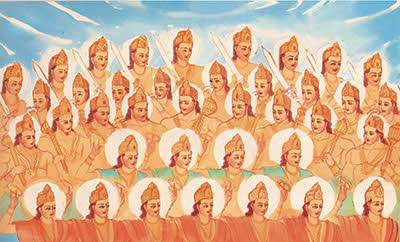
One day, the gods came to a garden outside the city to honor Muni Silandhara who had acquired omniscience. The King was informed about this by Subuddhi and, his mind engraved with faith, went on horseback to the best of munis. After the King had sainted him and had seated himself, the Muni delivered a sermon that was moonlight to the darkness of wrong doctrine. At the end of the sermon, the King with folded hands asked him, ‘Master, to what condition of existence did my father go after death?’ The Blessed One said, ‘O King, your father went to the Seventh hell. There is no other abode for such people.’ When he heard that, the King felt disgust with the world. He saluted the Muni, arose, and went to his own palace. He handed over the kingdom to his son, and said to Subuddhi, ‘I intend to become a mendicant. Always advise my son in regard to Dharma, as you did me.’ He replied, ‘I shall become a mendicant with you, O King. My son will teach Dharma to your son, as I did to you.’ The King and the minister took the vow, the thunderbolt for splitting the mountain of karma, and, after observing it for a long time, attained emancipation.
In your family there was another king, named Dandaka, whose rule was cruel, like Yama in person to his enemies. He had a son, known as Manimalin, filling the sky with Splendor like the sun. Dandaka became infatuated with his sons, friends, and wife, jewels, gold, and money, which were more desired than life itself. In course of time Dandaka died, absorbed in painful meditation and was born in his own treasury as a boa constrictor, unrestrainable. Cruel, devouring everything like a fire that has started, he killed whoever entered the treasury.
One day he saw Manimalin entering the treasury, and from recollection of his former birth recognized that he was his son. As he presented a quiet appearance, like affection embodied, Manimalin knew that he was some relation in a previous birth. Through wise munis he knew that he was his own father and, seated before him, instructed him in the Jain religion. He comprehended the religion of the Arhats and adopted renunciation. He died absorbed in good meditation and became a god. Out of affection for his son, he descended from heaven and gave Manimalin the divine pearlnecklace which is now over your heart. You belong to the family of Hariscandra, and I to that of Subuddhi. Because of inherited affection I urged you in regard to Dharma. Hear the reason why it was explained at an inopportune time. Today I saw two flying-ascetics in Nandana. Producing light for the world, destroying the darkness of delusion, they were like the sun and moon together in one place in person. Possessing supernatural knowledge, they delivered a sermon. At a suitable time, I asked them how long Your Majesty would live. They affirmed that Your Majesty would live only for a month. Therefore, I hurry you on to Dharma alone, wise sir”’
Mahabala said: “O Svayambuddha, treasure-house of wisdom, you alone are my friend, since you are concerned about my affairs. You have rightly waked me who was overcome by worldly pleasures, sleepy with the sleep of confusion. Guide me. What shall I do henceforth?
How much Dharma can be acquired now in the little life left? What sort of well-digging can be done suddenly when the fire is close behind?” Svayambuddha replied: “Do not despair. Be courageous. Have recourse to the duties of monks, the only friend for the next world. A soul that becomes a mendicant even for one day attains emancipation, to say nothing of heaven.”
Mahabala agreed, and installed his son in his place, as an acharya installs an image in a temple. From compassion he gave alms to such an extent to the poor and helpless people that there were no people distressed by begging thereafter. Like another Sakra, he made a pooja in all the temples with various garments, jewels, gold, flowers, etc. Then he begged forgiveness of his family and retinue, and at the feet of the best of munis took initiation, the friend of the Sri of emancipation. Together with abandonment of all censurable activities the noble man renounced the four kinds of food. Constantly immersed in the pool of nectar of abstract meditation, he, like a lotus-bed, did not fade at all. He, the crest jewel of the noble, had undiminished beauty, as if he had been eating food and taking drink. Engaged in meditation, recalling the homage to the Five Supreme Ones, he died after fasting for twenty two days. He went immediately to the Isana-heaven, hard to attain, by means of merit acquired, as if by divine horses.
Then he was born in the hollow of a couch in the palace Sriprabha, like a mass of lightning in a cloud. He had a divine form, symmetrical, his body free from the seven elements, his body was soft as a sirisa flower, the sky was filled with his beauty, he had an adamantine body, was very powerful, was marked with favorable characteristics, could change his form at will, possessed clairvoyant knowledge, was proficient in all kinds of knowledge, endowed with magic powers to make himself small, etc., was free from blemishes, had inconceivable glory, and was named ‘Lalitanga’ in the true sense of the word. On his feet were jeweled anklets, a girdle around his hips, a pair of bracelets on his wrists, a pair of armlets on his arms, a string of pearls on his chest, a necklace on his neck, earrings in the lobes of his ears, and a wreath and diadem on his head such a collection of ornaments and divine garments, and with them youth, the ornament of the whole body.











No comments yet.
Leave a comment